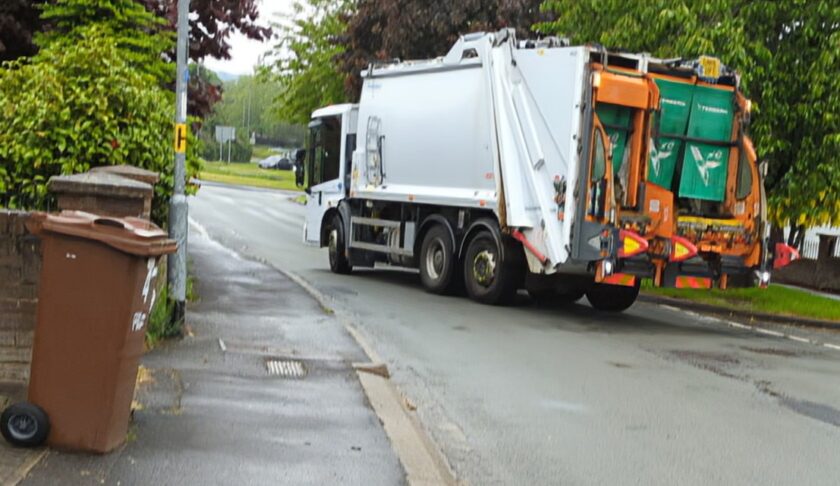Monthly bin collections loom for Flintshire residents as council battles to hit waste targets

Flintshire Council could cut black bin collections to once every four weeks as it tries to get to grips with tough Welsh Government recycling targets and huge financial pressures.
A report to be presented to councillors next week recommends the Council transition to a new four-weekly waste collection model to meet the statutory recycling target of 70%.
The target has increased from the previous 64% as part of the Welsh Government’s “Beyond Recycling” strategy.
The decision comes in response to the Council’s consistent shortfalls in meeting previous targets and the looming threat of significant financial penalties.
Flintshire has fallen short of the 64% recycling target over the past four years, with performance figures showing 63.98% in 2020/21, 60.08% in 2021/22, 61.51% in 2022/23, and 62.77% in 2023/24.
The Council’s move to adopt a new model is influenced by the Welsh Government’s potential enforcement of fines for not meeting targets.
Without significant service changes, the Council risks incurring fines exceeding £1 million annually.
The Welsh Government Cabinet Secretary for Climate Change and Rural Affairs has emphasised the need for ‘credible and committed’ actions to avoid further penalties.
To cover future fines, a 1% annual rise in council tax may be necessary, the Council has said.
Flintshire is also facing a budget gap of £32 million in 2024/25, with potential solutions identified to bridge the gap at £18 million, leaving a remaining shortfall of some £14 million.
“There is little left to cut and without more funding, difficult decisions will need to be made to deliver a balanced budget,” the Council has said.
The disposal of residual waste currently costs Flintshire Council £3.4 million annually. Achieving the 70% recycling target could reduce this expenditure.
Additionally, failing to meet recycling targets may jeopardise the Sustainable Waste Management Grant, which supports local waste management initiatives and is valued at £742,000 per year.
Reduced collections are expected to cut greenhouse gas emissions by 2,045 tonnes CO2e and generate an annual net saving of approximately £770,000, a council report notes.
New Model
Following a public consultation in early 2024 and the adoption of the Resource and Waste Strategy in March, the Council approved a new ‘restricted capacity residual waste collection model.’
Identified as the most effective through extensive modelling exercises with climate action group WRAP Cymru and other partners, the model involves reducing residual waste collections (black bins) to once every four weeks while maintaining a comprehensive weekly recycling service and retaining the 180L black wheeled bin.
The modelling exercise demonstrated that four-weekly collections would achieve the highest recycling performance increase and significant operational cost savings.
The projected boost to recycling rates from moving to four-weekly collections would be 5.9 percentage points, bringing the potential overall recycling performance to 68.67%, just shy of the 70% target.
According to a report by Kate Wilby, Chief Officer of Streetscene and Transportation, evidence from other Welsh local authorities shows that transitioning to a reduced-capacity collection model does not lead to increased fly-tipping.
Flintshire’s weekly food and recycling collections, along with fortnightly garden collections, provide sufficient room in black bins for residual waste, the report states.
Bulky items like mattresses and sofas, typically fly-tipped, don’t fit in wheeled bins and can be taken to Household Recycling Centres (HRCs) or collected through the Council’s bulky waste service.
A detailed communications plan and ensuring residents have the correct recycling containers will be developed, according to the Council.
As part of the new Resource and Waste Strategy, increased engagement and education efforts, improved recycling compliance, and strategic investments in waste management infrastructure are included.
The Council said it aims to foster a culture of recycling among residents, emphasising the environmental and economic benefits of diverting waste from landfills.
For larger households of six or more people, the Council offers a larger 240L wheeled bin upon request, provided that they are maximising their recycling efforts.
Councillors sitting on the Environment & Economy Overview & Scrutiny Committee will discuss the report on Tuesday, 16th July.
Officers have recommended the committee “supports a transition to the most effective service delivery model of retaining a comprehensive weekly recycling collection service and reducing residual waste collections to once every four weeks while retaining the 180L black wheeled bin to realise maximum recycling performance increase, greenhouse gas emission reduction, and cost reduction.”
Spotted something? Got a story? Email: [email protected]
Latest News
